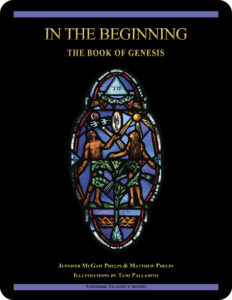 In the Beginning:
In the Beginning:
The Book of Genesis
Lesson 28 Jacob’s Final Words to His Sons
the book of Genesis 48:1—50:26
Revised Standard Version Catholic Edition (RSVCE)*
New American Bible Revised Edition (NABRE)*
Catechism of the Catholic Church
ex libris (in our library)
cross references in the book of Genesis
This material coordinates with Lesson 28 on pages 152–159 in the study book In the Beginning: The Book of Genesis.
“And God saw everything that he had made, and behold, it was very good. And there was evening and there was morning, a sixth day. Thus the heavens and the earth were finished, and all the host of them. And on the seventh day God finished his work which he had done, and he rested on the seventh day from all his work which he had done.”—the book of Genesis 1:31—2:2
welcome to our in-depth study of the book of Genesis
We invite interested groups and individuals to check out the sample first lesson from this 28-lesson  Turning to God’s Word Catholic Bible study.
Turning to God’s Word Catholic Bible study.  These online study pages link to our free lesson video overviews as well as to a list of cross references in the biblical text. Other study aids include maps, charts, illustrations, additional commentary, and prayers based on the primary Scripture in each lesson. In the Beginning: The Book of Genesis has been granted an imprimatur and can be purchased from our website shop. If you have a Bible-study question or comment, click on one of the “ask us your question” or “what do you think” buttons on any online study page.
These online study pages link to our free lesson video overviews as well as to a list of cross references in the biblical text. Other study aids include maps, charts, illustrations, additional commentary, and prayers based on the primary Scripture in each lesson. In the Beginning: The Book of Genesis has been granted an imprimatur and can be purchased from our website shop. If you have a Bible-study question or comment, click on one of the “ask us your question” or “what do you think” buttons on any online study page.
open with prayer
It’s always wise to begin any Bible study with prayer, whether reading the Scriptures alone or meeting with others in a discussion study group. You can pray using your own words or use one of the opening prayers on our website. We especially like the following:
Lord Jesus, you promised to send your Holy Spirit
to teach us all things.
As we read and study your word today,
allow it to touch our hearts and change our lives. Amen.
let’s review—the book of Genesis 46:1—47:31
In Lesson 27 Thus Israel Dwelt in Egypt, the names of the male members of Jacob’s family who traveled to Egypt with their wives and children are recorded in the forty-sixth chapter in the book of Genesis. Pharaoh agrees to allow Joseph’s transplanted family to settle in the rich delta area of Goshen. Joseph’s father Jacob is shown special respect. Meanwhile, through a series of shrewd practices, Joseph secures control of vast amounts of land in Egypt for Pharaoh. The descendants of Jacob dwell peacefully in the land, where they multiply. As Jacob approaches his death, he asks his sons to promise not to bury him in Egypt but to return his body to the burial place of his ancestors in the land of Canaan.
map notes—looking ahead 400-some years
Because of the flexible nature of the boundaries of the territories allotted to the different tribes, the map with our final lesson shows an approximation of where the descendants of the sons of Jacob eventually settle in the Promised Land. Until this time, God’s people have been called Hebrews, but they now begin 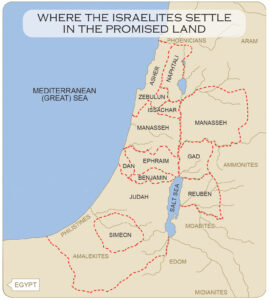 to be referred to as Israelites in honor of Jacob (Israel), their forefather who’s considered the founder of the 12 tribes of Israel. The Jewish religion, based on Hebrew worship practices, won’t develop for quite some time. Members of the tribe of Judah properly are called Judahites. The return of the Israelites from Egypt to the land of Canaan won’t occur for another 400 or so years, however. The circumstances under which that happens are described at length in the book of Exodus, the second book of the Torah. Torah is the Hebrew name given to the first five books of the Old Testament. Click on the map (right) to enlarge it. The original map is on page 157 in the study book In the Beginning: The Book of Genesis.
to be referred to as Israelites in honor of Jacob (Israel), their forefather who’s considered the founder of the 12 tribes of Israel. The Jewish religion, based on Hebrew worship practices, won’t develop for quite some time. Members of the tribe of Judah properly are called Judahites. The return of the Israelites from Egypt to the land of Canaan won’t occur for another 400 or so years, however. The circumstances under which that happens are described at length in the book of Exodus, the second book of the Torah. Torah is the Hebrew name given to the first five books of the Old Testament. Click on the map (right) to enlarge it. The original map is on page 157 in the study book In the Beginning: The Book of Genesis.
what’s next for the people of God?
Although where each tribe settles makes little difference in terms of the book of Genesis, a knowledge of these locations is valuable when studying the rest of the Bible. The tribe to follow is that of Judah, into which the Messiah will be born. The term Jew is derived from the name Judah, but it refers specifically to those persons—descendants of Judah or not—who practice the religion of Judaism. That religion is based on Hebrew worship practices but doesn’t develop until much later—around the end of the  Babylonian Exile in 538 B.C. You can learn more about the next phase in salvation history in the Turning to God’s Word Catholic Bible study You Shall Have No Other Gods: The Book of Exodus.
Babylonian Exile in 538 B.C. You can learn more about the next phase in salvation history in the Turning to God’s Word Catholic Bible study You Shall Have No Other Gods: The Book of Exodus.
 Jacob’s farewell address to his sons (25:47)
Jacob’s farewell address to his sons (25:47)
In the video overview for this lesson, Turning to God’s Word author Matthew Phelps  addresses the farewell address of the patriarch Jacob to his 12 sons. At the end of the book of Genesis Jacob also adopts the first two sons born to Jacob. Joseph refers to his sons in order of their birth as Manasseh and Ephraim, but Jacob deliberately switches this order, giving apparent preference to the younger, Ephraim, whom Jacob always refers to first. This not only reflects Jacob’s own position as the second of the twins born to Isaac and Rebekah, it also foreshadows Jesus as the new Adam. The
addresses the farewell address of the patriarch Jacob to his 12 sons. At the end of the book of Genesis Jacob also adopts the first two sons born to Jacob. Joseph refers to his sons in order of their birth as Manasseh and Ephraim, but Jacob deliberately switches this order, giving apparent preference to the younger, Ephraim, whom Jacob always refers to first. This not only reflects Jacob’s own position as the second of the twins born to Isaac and Rebekah, it also foreshadows Jesus as the new Adam. The  videos for this study are being redone and will be posted as they become available. The original videos for Lessons 4 through 28 will remain accessible until then.
videos for this study are being redone and will be posted as they become available. The original videos for Lessons 4 through 28 will remain accessible until then.
The Scripture ranges for the videos being redone to accompany this Catholic Bible study from Turning to God’s Word will match the Scripture ranges for the sets of questions in the study book In the Beginning: The Book of Genesis. Viewers will be able to follow along as author Matthew Phelps discusses Lesson 28, “Jacob’s Final Words to His Sons,” on pages 152–159 in the study book.
WHAT DO YOU THINK about Jacob adopting Joseph’s Egyptian sons?
One of the things that causes confusion regarding the 12 tribes of Israel is Jacob’s adoption of Joseph’s Egyptian-born sons, which is described in the forty-eighth chapter in the book of Genesis.
? What reason do you think that Jacob has for wanting to adopt Joseph’s sons as his own?
 ? What benefits come to Ephraim and Manasseh as a result of being adopted by Jacob?
? What benefits come to Ephraim and Manasseh as a result of being adopted by Jacob?
? Consider what might be behind why Jacob insists on bypassing Joseph’s first son Manasseh in favor of Ephraim.
? What does Jacob leave to Joseph as an inheritance in the land of Canaan?
? How does this inheritance differ from what Jacob leaves to his other sons and to Joseph’s two Egyptian-born sons?
? What indication is there in the biblical text that Joseph places high value on the inheritance he receives from his father?
pray with the Psalms—Ephraim & Manasseh, Reuben & Simeon, & O God of hosts, bring us back
The book of Genesis 48:5 records Jacob telling Joseph: “And now your two sons, who were born to you in the land of Egypt before I came to you in Egypt, are mine; Ephraim and Manasseh shall be mine, as Reuben and Simeon are.” It can be easy to miss that Jacob is claiming Joseph’s sons on equal footing with his own two first-born sons, Reuben and Simeon. This sheds some light on Psalm 78:67, in which  the Psalmist, before explaining that God has chosen the territory of Judah as the location for his Holy City, feels it necessary to write: “He [the LORD] rejected the tent of Joseph, he did not choose the tribe of Ephraim….”
the Psalmist, before explaining that God has chosen the territory of Judah as the location for his Holy City, feels it necessary to write: “He [the LORD] rejected the tent of Joseph, he did not choose the tribe of Ephraim….”
? What are the common links between Joseph, Ephraim, Benjamin, and Manasseh?
? Why might the Psalmist single out these descendants of Jacob for special mention?
 An awareness of the genealogies in the book of Genesis sheds insight on passages in other books of the Bible. Knowing about Jacob’s adoption of Joseph’s sons leads to greater understanding of what’s going on in Psalm 80, which begins: “Give ear, O Shepherd of Israel, thou who leadest Joseph like a flock!! Thou who art enthroned upon the cherubim, shine forth before Ephraim and Benjamin and Manasseh.” Prayed at Thursday Lauds (Week I),
An awareness of the genealogies in the book of Genesis sheds insight on passages in other books of the Bible. Knowing about Jacob’s adoption of Joseph’s sons leads to greater understanding of what’s going on in Psalm 80, which begins: “Give ear, O Shepherd of Israel, thou who leadest Joseph like a flock!! Thou who art enthroned upon the cherubim, shine forth before Ephraim and Benjamin and Manasseh.” Prayed at Thursday Lauds (Week I),  Psalm 80 is included as part of Lesson 10 Awake, My Soul in the Turning to God’s Word Catholic Bible study Sing a New Psalm: Communicating with God Through the Prayers of the Church—Volume I: Lauds & Vespers. Prayed at Thursday Vigils (Week II), Psalm
Psalm 80 is included as part of Lesson 10 Awake, My Soul in the Turning to God’s Word Catholic Bible study Sing a New Psalm: Communicating with God Through the Prayers of the Church—Volume I: Lauds & Vespers. Prayed at Thursday Vigils (Week II), Psalm  78 will be included as part of Lesson 23 Hidden Lessons of the Past, in Volume II: Vigils, Day Prayer & Compline, which is scheduled for publication in late summer of 2025.
78 will be included as part of Lesson 23 Hidden Lessons of the Past, in Volume II: Vigils, Day Prayer & Compline, which is scheduled for publication in late summer of 2025.
 Israel & Judah—you could look it up in our archives
Israel & Judah—you could look it up in our archives
Many Christians misuse the terms “Israel” and “Judah,” missing out on some of what’s going on in Scripture. The meanings of these words can be traced back to the book of Genesis. Read Lost in Translation, an online column in which Turning to God’s Word author Matthew Phelps helps readers connect with ideas expressed in the original languages of the Scriptures. New Lost in Translation entries are posted on Mondays, and past entries are archived on our website. Contact us if you’d like to receive Lost in Translation by email every week.
the popes inspire us—God’s presence in history
On December 17, 2013, Pope Francis addressed the importance of our Christian heritage and the genealogies found in Sacred Scripture:
“Inheritance and genealogy are keys to interpreting the forty-ninth chapter in the book of Genesis in conjunction with the Gospel According to Matthew 1:1–17. In the book of Genesis, Jacob foretells a glorious line of descendants for Judah, 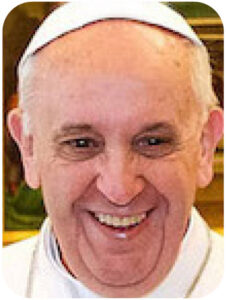 while the Gospel passage recounts the genealogy of Jesus. In this genealogy, we aren’t dealing with a list in a telephone book but with pure history, for God sent his Son among men. Jesus is consubtantial with God, the Father, but also consubstantial with his Mother, a woman. And this is his consubtantiality with his Mother: God entered history, God wanted to become history. He is with us. He has journeyed with us.
while the Gospel passage recounts the genealogy of Jesus. In this genealogy, we aren’t dealing with a list in a telephone book but with pure history, for God sent his Son among men. Jesus is consubtantial with God, the Father, but also consubstantial with his Mother, a woman. And this is his consubtantiality with his Mother: God entered history, God wanted to become history. He is with us. He has journeyed with us.
“It was a journey that began long ago, Immediately after the original sin, God had this idea: to make the journey with us. He called Abraham and invited him to walk. Abraham began the journey: He begot Isaac, and Isaac begot Jacob, and Jacob begot Judah. And so it went, over the course of history. God journeys with his people because he didn’t want to come and save us apart from history. It’s a history wrought of holiness and sin. The genealogy of Jesus includes sinners who didn’t know how to respond to the design God had in mind. And yet God made history with them all.
questions to ask in any Bible study
What does this Catholic Bible study of the book of Genesis tell us about God? What does God reveal about himself in this book of Scripture?
connect the book of Genesis to your own life
The book of Genesis is an account of the early history of humanity and of the way that God begins to arrange for the salvation of the world. Consider writing a history of your own spiritual life. What are the most significant events that have occurred to draw you into closer relationship with God? What are some events that seemed insignificant at the time but later proved to be critical to your spiritual development? What are your spiritual goals? How do you intend to achieve them?
just for fun—a trivia quiz about the book of Genesis
Check out the online quiz created by Turning to God’s Word co-founder Tami Palladino. The questions  are multiple-choice, and it will take only a few minutes to read through all of them and find out what you’ve learned.
are multiple-choice, and it will take only a few minutes to read through all of them and find out what you’ve learned.
? What other questions would you include if you were preparing this quiz for your study group?
? Which passage from the book of Genesis did you find to be the most relevant in your life, and why?
? How have your ideas about the Catholic faith changed as a result of studying In the Beginning: The Book of Genesis?
 ? What’s one unexpected way that this Bible study has touched your life?
? What’s one unexpected way that this Bible study has touched your life?
? What’s something you’ve learned from studying In the Beginning: The Book of Genesis that you’d like to share with others?
? To whom would you like to recommend In the Beginning: The Book of Genesis?
? What book of the Bible would you like to study next, and why?
oops—a correction in the study book
Despite our best efforts reading and rereading our Bible studies before we send them to be printed, occasionally something wrong or confusing sneaks past us. In subsequent printings of In the Beginning: The Book of Genesis, the citation in Question 6 of this lesson will be corrected to the Book of Judges 19:1—21:25. The updated Question 6 now reads:
Question 6 Read the book of Genesis 49:22–27. Jacob’s final blessings go to the sons of Rachel. Consider what you think it is that makes the blessing given to Joseph significantly different from the blessings given to his other brothers. Read the Book of Judges 19:1—21:25 to learn the tragic fulfillment of the blessing given to Benjamin. Why do you think it is that Benjamin and Joseph are so different?
t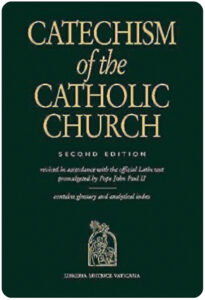 he best Catholic commentary about Scripture
he best Catholic commentary about Scripture
To find out more about how Church teaching is supported by Scripture passages in In the Beginning: The Book of Genesis, check out the Index of Citations in the Catechism of the Catholic Church. Links (Revised Standard Version Catholic Edition [RSVCE*]) to the primary Scripture passages in the lesson and relevant paragraphs in the Catechism are provided here. Not every passage in the biblical text for this Catholic study is referenced in a Catechism paragraph, however.
the book of Genesis 49:24—paragraph 269
the book of Genesis 50:20—paragraph 312
to learn more, read more Scripture
If you’re having difficulty with a particular passage of Scripture, it can be helpful to read the relevant  cross references—but looking these up can take time. To make that easier, we’ve compiled the cross references from the Revised Standard Version Second Catholic Edition (RSV2CE)—the translation that we reprint in our study books. That list can be found at the top of every online study page, and it includes links to cross references in the primary biblical text for In the Beginning: The Book of Genesis.
cross references—but looking these up can take time. To make that easier, we’ve compiled the cross references from the Revised Standard Version Second Catholic Edition (RSV2CE)—the translation that we reprint in our study books. That list can be found at the top of every online study page, and it includes links to cross references in the primary biblical text for In the Beginning: The Book of Genesis.
don’t forget about our indexes & extra online material

 If you’re trying to locate information about a specific Scripture passage, you can look it up in the index at the back of the study book or sample lesson. If you want to find a particular commentary, you can look up its title in the topics index. To learn more about another book of the Bible for which there’s a Turning to God’s Word study, visit the online study directories to read the commentaries and watch any accompanying videos. Finally, if you have a question or would like to make a comment about any of our studies, you can use one of the “ask us your question” or “what do you think” buttons to email our authors.
If you’re trying to locate information about a specific Scripture passage, you can look it up in the index at the back of the study book or sample lesson. If you want to find a particular commentary, you can look up its title in the topics index. To learn more about another book of the Bible for which there’s a Turning to God’s Word study, visit the online study directories to read the commentaries and watch any accompanying videos. Finally, if you have a question or would like to make a comment about any of our studies, you can use one of the “ask us your question” or “what do you think” buttons to email our authors.
ex libris—Church documents & books about religious topics
Link to magisterial documents referred to in our Bible studies at ex libris—magisterial documents.  This listing includes significant recent encyclicals as well as a number of historical Church documents. Recommended books related to Scripture study can be found at ex libris—main bookshelf.
This listing includes significant recent encyclicals as well as a number of historical Church documents. Recommended books related to Scripture study can be found at ex libris—main bookshelf.
wondering how to pronounce some of these words?
The following link is to a reading from the New International Version (NIV) Bible. To listen, open the link and click on the audio icon above the printed text. Although not taken from the translations used in our study materials, the NIV reading provides an audio guide to pronunciation of words in this lesson’s primary biblical text. A close online version of the translation of the Bible used in Catholic liturgy in the United States as well as an audio guide for daily Mass readings for the current month can be found on the website of the United States Conference of Catholic Bishops (USCCB).
the book of Genesis 48:1—50:26 (NIV)
 close with Bible-based prayer related to this lesson
close with Bible-based prayer related to this lesson
Many of our Catholic study groups like to conclude their discussions with a prayer based on the scriptural focus of their lesson, and some participants include Scripture-specific prayer in their individual study. If you’re uncomfortable composing your own Bible-based prayers, you can follow our four easy steps. If you prefer, you can use the following prayer based on this lesson’s text from the book of Genesis.
O God, you created the world and keep it in existence through love.
Enable us to trust in your loving mercy and to rely on your Word
to bring us into communion with the Blessed Trinity.
We ask this in the name of Jesus Christ,
whom you sent to show us the way to eternal life. Amen.
Lesson 27 Thus Israel Dwelt in Egypt—the book of Genesis 46:1—47:31
you also may like our two-part study of the prophets
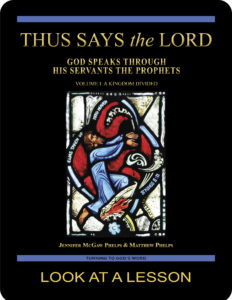
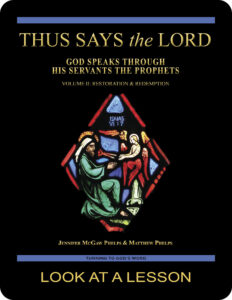 Thus Says the LORD: God Speaks Through His Servants the Prophets—Volume I: A Kingdom Divided examines the prophets in their historical context using the First and Second Books of the Kings and other Old Testament passages written before the Babylonian Exile in 586 B.C. Volume II: Restoration & Redemption looks at the post-exilic prophets. This 51-lesson Catholic Bible study builds on The United Kingdom of Israel: Saul, David & Solomon Foreshadow Christ the King. Click on the books’ covers to view a sample lesson from each volume.
Thus Says the LORD: God Speaks Through His Servants the Prophets—Volume I: A Kingdom Divided examines the prophets in their historical context using the First and Second Books of the Kings and other Old Testament passages written before the Babylonian Exile in 586 B.C. Volume II: Restoration & Redemption looks at the post-exilic prophets. This 51-lesson Catholic Bible study builds on The United Kingdom of Israel: Saul, David & Solomon Foreshadow Christ the King. Click on the books’ covers to view a sample lesson from each volume.
start a Turning to God’s Word Bible study
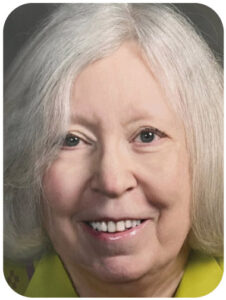 Thank you for your interest in our study In the Beginning: The Book of Genesis.
Thank you for your interest in our study In the Beginning: The Book of Genesis.  Information about beginning a Turning to God’s Word Catholic Bible study can be found at start a Bible study. Tami, Matthew, and I are available to answer questions and offer support. Contact us if you’d like to start a Turning to God’s Word study or have your schedule listed with other TtGW study groups on our website. —Jennifer
Information about beginning a Turning to God’s Word Catholic Bible study can be found at start a Bible study. Tami, Matthew, and I are available to answer questions and offer support. Contact us if you’d like to start a Turning to God’s Word study or have your schedule listed with other TtGW study groups on our website. —Jennifer
*There are seven deuterocanonical books in the Old Testament—the Books of Tobit, Judith, Wisdom, Sirach, Baruch, and First and Second Maccabees, as well as some passages in the Books of Esther and Daniel. Protestants usually refer to these works as “apocryphal,” a word that means “outside the (Protestant) canon” because they’re excluded from most Protestant Bibles. The word “deuterocanonical” means “second canon”; Catholics use that word to refer to any section of the Catholic Old Testament for which there are no extant, or existing, Hebrew manuscripts. All of the deuterocanonical books appear in the Septuagint, the earliest remaining versions of which date to the 1st century B.C. This Greek translation of the Old Testament was in common use by Jews at the time of Jesus—but the same books aren’t found in existing Hebrew manuscripts, which aren’t as old as the oldest version of the Septuagint. Learn more by reading How Do Catholic & Protestant Bibles Differ?
Turning to God’s Word printed Bible studies use the 2006 Revised Standard Version Second Catholic Edition (RSV2CE) translation for all Scripture references except those to the Psalms, which are taken from The Abbey Psalms and Canticles, prepared by the Benedictine monks of Conception Abbey and published in 2020 by the United States Conference of Catholic Bishops (USCCB). All Scripture links for the online study pages for In the Beginning: The Book of Genesis are to the 1966 Revised Standard Version Catholic Edition (RSVCE) translation. The New International Version (NIV) audio recordings follow the same chapter and verse numbering as the RSV Catholic translations, but the NIV translation doesn’t include the deuterocanonical books and passages.
The 1966 RSVCE uses archaic pronouns and verb forms such as “thee,” “thou,” “didst” in the Psalms and in direct quotations attributed to God. The 2006 RSV2CE replaces those with more accessible English. The few significant translation changes in the RSV2CE include rendering almah as “virgin” in the Book of Isaiah 7:14 and restoring the term “begotten” in the Gospel According to John 3:16.
Numbering varies for some passages in this Bible study. Turning to God’s Word studies (print and digital) follow the numbering in the Revised Standard Version Catholic translations (RSV2CE and RSVCE). Discrepancies in the New American Bible Revised Edition (NABRE) are noted in the Index of Scripture Citations in the study book and the online sample.
 You can learn more about the Psalms by viewing a sample lesson from the Turning to God’s Word Catholic Bible study Sing a New Psalm: Communicating with God Through the Prayers of the Church—Volume I: Lauds & Vespers. The second part of that study, Sing a New Psalm: Communicating with God Through the Prayers of the Church—Volume II: Vigils, Day Prayer & Compline, is scheduled for publication in 2025. Some verse numbers may vary in different translations of the Psalms.
You can learn more about the Psalms by viewing a sample lesson from the Turning to God’s Word Catholic Bible study Sing a New Psalm: Communicating with God Through the Prayers of the Church—Volume I: Lauds & Vespers. The second part of that study, Sing a New Psalm: Communicating with God Through the Prayers of the Church—Volume II: Vigils, Day Prayer & Compline, is scheduled for publication in 2025. Some verse numbers may vary in different translations of the Psalms.
